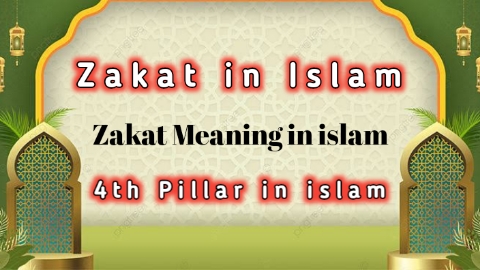
Zakat in Islam, also known as the “zakat meaning in Islam,” holds a central place in the faith and practice of Muslims worldwide. As the third among the Five Pillars of Islam, Zakat is not merely a charitable contribution—it is an obligation and a form of worship that reflects a believer’s submission to Allah and compassion for society. Deeply rooted in Islamic teachings, Zakat purifies wealth, supports the needy, and helps create a just and balanced community.
In this article, we will explore the meaning, importance, and rules of Zakat in Islam, referencing Quranic guidance, Hadiths, and insights from Islamic scholarship to offer a comprehensive understanding for Muslims seeking authentic knowledge.
What is Zakat? | Zakat Meaning in Islam
The Arabic word Zakat (زكاة) comes from the root word zakā, which means purification, growth, and blessing. In Islamic terminology, Zakat is the obligatory act of giving a specific portion (usually 2.5%) of one’s wealth to those eligible among the poor and needy.
Unlike voluntary charity (sadaqah), Zakat is mandatory for every eligible Muslim who possesses wealth above a certain threshold known as the Nisab. It is a right of the poor upon the rich and serves as both an economic system and a spiritual purifier.
Allah says in the Quran:
“Accept a portion of their wealth as charity to purify and bless them, and ask Allah to send His mercy upon them.”
(Surah At-Tawbah, 9:103)
Thus, Zakat purifies not only wealth but also the heart from greed and selfishness.
The Position of Zakat Among the Pillars of Islam
Zakat is the third pillar of Islam, following Shahadah (faith) and Salah (prayer), and preceding Sawm (fasting) and Hajj (pilgrimage). Its placement reflects its foundational importance in building a cohesive Islamic society.
The Prophet Muhammad ﷺ said:
“The Prophet ﷺ said: Islam stands upon five pillars—faith in the oneness of Allah and the Prophethood of Muhammad ﷺ, regular prayer, giving charity (Zakat), fasting in Ramadan, and making the pilgrimage to the Kaaba.”
(Bukhari & Muslim)
This highlights that Zakat is more than just a financial obligation—it is a vital expression of a Muslim’s faith and devotion.
Why is Zakat Important in Islam?
- Spiritual Purification and Taqwa (God-consciousness)
Zakat fosters taqwa in believers by encouraging them to let go of material attachments and recognize their duty to support those in need. It cleanses the soul of miserliness and cultivates a heart filled with generosity and empathy. - Social Justice and Economic Balance
By redistributing wealth, Zakat:
- Narrows the gap between the rich and poor
- Reduces poverty and hunger
- Encourages dignity through self-sufficiency
- Uplifts the less fortunate without humiliating them
- Fulfillment of Divine Command
Zakat is a commandment from Allah. Ignoring it, while possessing the means, is a serious sin in Islam.
The Quran warns:
“As for those who pile up wealth in gold and silver and withhold it from Allah’s path—tell them they will face a tormenting punishment.”
(Surah At-Tawbah, 9:34)
The verse clearly highlights that failing to give Zakat has severe spiritual consequences.
Who is Eligible to Pay Zakat?
Zakat becomes obligatory when a Muslim:
- Is an adult (mentally sane)
- Owns wealth beyond the Nisab threshold
- Has held this wealth for a lunar year (hawl)
Nisab is set at the value of either 87.48 grams of gold or 612.36 grams of silver, and the total amount varies depending on which measure is followed. Most scholars recommend using the silver value to ensure broader benefit for the poor.
Who Can Receive Zakat?
The Quran clearly outlines eight categories of people who are eligible to receive Zakat:
“Zakat funds are meant for the poor, the needy, Zakat workers, new Muslims, to free captives, help those in debt, support Allah’s cause, and aid travelers in difficulty.”
(Qur’an 9:60)
This system ensures that Zakat not only addresses poverty but also strengthens the Muslim Ummah through strategic social support.
How to Calculate Zakat?
The most common form of Zakat is on monetary wealth, savings, gold, silver, and business assets. The general rate is 2.5% of one’s net savings that have been held for a lunar year.
Here’s a simple step-by-step guide:
- Determine your total assets (cash, gold, business profits)
- Deduct liabilities (debts payable within a year)
- Ensure the remaining amount exceeds Nisab
- Calculate 2.5% of that amount as your Zakat due
For example:
If you have $10,000 in savings above the Nisab for one year, your Zakat would be:
10,000 × 2.5% = $250
Real-World Story: The Impact of Zakat
In the early Islamic era, under the leadership of Caliph Umar ibn Abdul Aziz (رحمه الله), Zakat was so effectively distributed that there were no poor people left to receive it. This demonstrates the transformative power of Zakat when implemented properly in society.
Even today, we witness organizations funded by Zakat that support orphans, educate children, build hospitals, and provide relief to crisis-hit regions—all in the name of Islam.
Zakat and Its Connection to the Heart
One of the key lessons of Zakat is that wealth is a test, not a privilege. Allah entrusts us with resources to serve others. Giving Zakat with sincerity (ikhlas) draws a believer closer to Allah and deepens one’s faith.
The Prophet ﷺ said:
“Charity does not decrease wealth.”
(Sahih Muslim)
Rather than diminishing our assets, Zakat invites barakah (blessing) into our lives, and opens doors for more.
Conclusion: Zakat in Islam—A Path to Purity and Justice
In understanding the zakat meaning in Islam, we see that it is more than a financial duty—it is a form of worship, a means of purification, and a symbol of unity among Muslims. As one of the core pillars of Islam, Zakat fosters social justice, strengthens bonds of brotherhood, and brings blessings to both the giver and the recipient.
Let us strive to fulfill this beautiful obligation with sincerity and mindfulness, remembering that every act of giving draws us nearer to Allah’s mercy.
“When you give Zakat sincerely for the sake of Allah, you are the ones who will be rewarded many times over.”
(Qur’an 30:39)
May Allah guide us all to understand and act upon this pillar of faith with sincerity and joy. Ameen.
For more information Visite Our website: ( Hashmi Education Hub)
